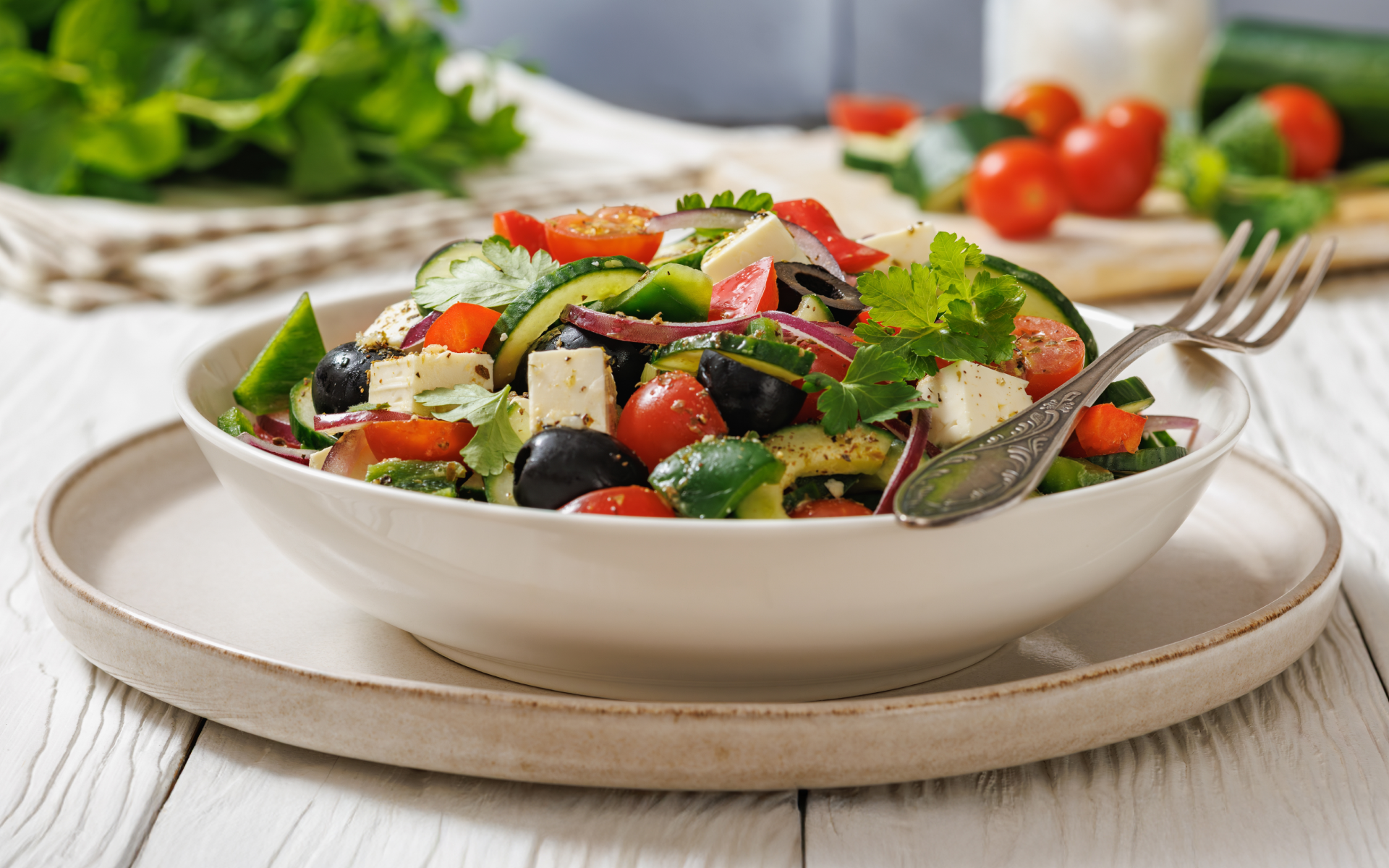When it comes to losing weight, creating a calorie deficit is the best thing to do. Eating and drinking fewer calories than your body burns in a day is the most effective way to lose weight over time. That being said, can the 800-calorie diet be the meal plan to help you lose weight and belly fat?
Is the 800-calorie diet really safe and sustainable for everyone? What should you eat while you’re following this meal plan and how much weight could you lose while on it? Check out this article to learn more about any potential pros and cons of this meal plan.
What Is an 800-Calorie Diet?
Also known as the ‘Fast 800 diet’, the 800-calorie diet is an incredibly low-calorie diet that requires people to consume 800 calories a day through food and drink for a specified amount of time.
While rapid weight loss is often the main goal of people who adopt this eating plan, proponents of it also claim it can reverse type 2 diabetes, regulate blood sugar levels, and lower high blood pressure (2).
What to Eat on an 800-Calorie Diet: What’s on the 800-Calorie Diet Menu
Regardless of what weight loss diet you are on, you should make sure to eat as healthily and balanced as possible and avoid cutting out any food groups. This will ensure that you consume all your macronutrients, vitamins, and minerals, which promotes weight loss and prevents malnutrition.
BetterMe App helps you achieve your body goals with ease and efficiency by helping to choose proper meal plans and effective workouts. Start using our app and you will see good results in a short time.
Foods that should be included in an 800-calorie diet plan include:
Complex carbohydrates
These include foods such as whole wheat, brown and wild rice, oats, and quinoa. Not only do they contain more nutrients than simple/refined carbohydrates, they also have more fiber, which makes them more filling and great for digestive and heart health (28).
Dark leafy greens
Popular examples of dark leafy greens include bok choy, arugula, Swiss chard, kale, collard greens, and romaine lettuce. Not only are these greens low in calories, carbs, sodium, and cholesterol, they’re also rich in various vitamins and minerals (8).
All these factors make leafy greens ideal for weight loss (and maintaining a healthy weight) and preventing a number of diseases such as cancer, osteoporosis, and several inflammatory diseases.
Fruits
As with vegetables, fruits are essential in every healthy weight loss diet. They are rich in antioxidants, which help keep your immune system strong and potentially prevent disease (13). However, some fruits are higher in sugar and carbs than others and this may affect your calorie intake on the 800-calorie diet.
Some low-calorie fruits that can safely be consumed without the risk of a calorie surplus include lemons, strawberries, grapefruit, blackberries, blueberries, and pineapples. These fruits are excellent sources of essential vitamins and minerals; they’re high in fiber and also provide a wide range of health-boosting antioxidants.
Lentils and legumes
They are naturally low in fat, practically free of saturated fat, and provide fiber, protein, complex carbohydrates, B vitamins, iron, copper, magnesium, manganese, zinc, and phosphorus (19).
They’re also quite filling and take longer to digest, so they’ll keep you from exceeding your caloric deficit. Examples include peas, kidney beans, chickpeas, soybeans, lentils (brown, green, red, and yellow), and black beans.
Lean proteins
When you’re looking to lose weight, a high protein diet is essential as it helps by increasing the satiety hormones while reducing levels of the hunger hormone, ghrelin. Proteins also take more energy to digest, which makes you burn a few extra calories (31).
Lean proteins are better as they have less saturated fat. Examples include skinless poultry such as chicken, duck, and turkey, beans and lentils, lean beef, tofu, and egg whites.
Oily fish
Examples include trout, tuna, salmon, mackerel, herring, sardines, and pilchards. They’re rich in protein and omega-3 polyunsaturated fatty acids, which may help reduce inflammation and prove beneficial in lowering the risk of heart disease, cancer, and arthritis (12).
A variety of vegetables
Dark leafy greens are not the only vegetables you should consume on the 800-calorie diet. It’s best if you try to fill your shopping cart with as many vegetables and fruits as possible.
A diet that is rich in vegetables and fruits can help lower blood pressure, reduce the risk of heart disease and stroke, prevent certain types of cancer, lower the risk of eye and digestive problems, and positively affect blood sugar levels, which can help keep your appetite in check (32).
Read more: 7-Day Weight Loss Low-Carb Diet: Choose High-Protein, High-Fiber, or Ultra-Low-Carb
What Is a Good 800-Calorie Diet?
Regardless of the many promises of weight loss through this eating plan, there is no good formulation of an 800-calorie diet plan. This is because the 800-calorie diet is classified as a very low-calorie diet (VLCD).
Very low-calorie diet plans are rapid weight loss plans that are incredibly restrictive for anyone who participates in them. They can also cause medical complications and other side effects in the long term (33). Therefore, no doctor or dietitian would recommend such an eating plan to most people.
However, there are some exceptions to this rule.
The 800-calorie diet could be used as a short-term weight loss plan for obese and severely obese patients who are managing diabetes, going to have surgery, or preparing for fertility treatment. It should be noted that even in these cases, patients are closely monitored by doctors in case of any complications (18).
Another important point to note is that this diet is not for anyone with a BMI between 27 and 30. It is exclusively reserved for those with a BMI of 30 or higher. The only time anyone with a BMI of 27 to 30 would be placed on an 800-calorie diet plan is if they have a medical condition that is related to their weight, such as diabetes or high blood pressure (33).
Is the 800-Calorie Diet Safe?
No, it is not. As stated above, even in the exempted demographics, people on this diet still need to be closely monitored by medical professionals.
It should also be remembered that as a general rule, men and women require approximately 2,500 and 2,000 calories, respectively, to maintain weight. When trying to lose weight, it is advisable to cut your daily caloric intake by 500 to 750 calories a day and no more. This can help you lose 1 to 2 pounds a week (6).
From the above advice, it is clear to see that a daily diet of just 800 calories means that you are reducing your daily intake by much more than the recommended amount. This can lead to nutritional deficiencies and muscle loss instead of the intended fat loss (16).
Therefore, the 800-calorie diet is not a safe eating plan for anyone unless they’re under medical supervision. Children, teens, and older adults should also not attempt the 800-calorie diet as it can affect their growth and development, have potential side effects, and aggravate pre-existing medical conditions and/or medication needs (35).
If you wish to free yourself from all the extra pounds that have been weighting you down for way too long, start using the BetterMe app and overhaul your entire life!
What Are Some Side Effects of an 800-Calorie Diet?
If you’re still not convinced this eating plan is bad for you, here are some 800-calorie diet side effects that may help change your mind:
Increased risk of illnesses
This is especially linked to the 800-calorie low-carb diet.
While low-carb diets have been praised for helping with weight loss, lowering blood pressure, and improving blood glucose control in many people, these results are usually short-lived.
When followed for a long time, such diets may increase the risk of death due to cardiovascular disease, cerebrovascular disease, and cancer. This could be due to the reduced intake of fiber and fruits and the increased intake of animal protein, cholesterol, and saturated fat in such diets (21).
The 800-calorie low-carb diet makes matters worse as it is incredibly restrictive in terms of how much food you can eat in a day.
Nutrient deficiencies
While nutritional deficiencies can be caused by environmental factors or disease conditions, a lack of a proper diet containing all food groups that meets your calorie needs can also lead to malnutrition (23).
A low-carb eating plan such as the 800-calorie low-carb diet could lead to common nutrient deficiencies of nutrients such as calcium, Vitamin C, iron, Vitamin D, magnesium, Vitamin E, folate, and thiamin (Vitamin B1) (3).
Research on obese people who followed a low-calorie diet showed they experienced micronutrient deficiencies (24). Nutrient deficiencies can lead to a weak immune system, muscle weakness, hair loss, scaly skin, abnormal heart rhythms, reduced bone strength, and an increased risk of fractures (1).
Even if your 800-calorie diet isn’t low in carbs, you may also not be consuming enough protein. A lack of enough protein in your diet could lead to swelling, fatty liver, skin degeneration, the increase and severity of infections, and muscle wasting (4).
Temporary side effects
Some temporary but not life-threatening side effects of the 800-calorie diet and other VLCDs include fatigue, constipation, nausea, and diarrhea (34).
Increased risk of gallstones
A one-year comparative study in Sweden showed that people on a very low-calorie diet are three times more likely to get gallstones than those who follow a low-calorie diet (27). Gallstones can form in the gallbladder when bile hardens into a stone-like material, which can happen if there is too much bile salts, cholesterol, or bilirubin in it.
In addition to low-calorie diets, gallstones are also caused by obesity, diets that are high in refined carbohydrates and fats, and rapid weight loss (14). Women who are considering the 800-calorie diet plan should note that they are more likely to suffer from gallstones than men.
Lower metabolism
Metabolism is a series of chemical reactions in a living organism that creates and breaks down energy that is necessary for life. In layman’s terms, it’s the process by which your body converts what you eat and drink into energy.
People with a high or fast metabolism will burn more calories when they’re at rest and during activity, whereas those with a slower metabolic rate will burn fewer calories at rest and during movement or exercise (10). People with slower rates of metabolism are advised to eat less to counter this, but eating too little can lead to the opposite of the desired results.
Multiple studies have shown that low-calorie diets can decrease the number of calories the body burns by as much as 23 percent (1). The worst part is that this effect does not necessarily stop when you stop dieting. In some cases, your metabolism can remain at a slowed rate for up to 6 years after a very low-calorie diet plan (26).
May reduce fertility
A clinical trial published in 2003 showed that women who ate less disrupted the LH pulsatility in their bodies (22).
The luteinizing hormone (LH) is a reproductive hormone that is made in the pituitary gland that affects both the male and female reproductive systems. Without an increase in estrogen and luteinizing hormone in the body, a woman may not ovulate every month.
May weaken your bones
An 800-calorie diet may also reduce your estrogen levels. Research has shown that low estrogen levels together with an energy deficiency may trigger loss of bone mass in exercising women (30).
Bone turnover – the process of resorption followed by replacement by new bone with little change in shape – in younger women can also be affected by such a restrictive eating plan (11).
You’re likely to regain all the weight back
Crash dieting and very low-calorie diets are famous for being very unsustainable. Most of us would not be able to sustain an 800-calorie diet plan for more than a week, let alone for an entire month, without medical support.
This means that eventually, you’ll have to quit the diet and go back to your normal eating habits. As this way of eating is quite restrictive, eating a more normal amount of food will likely result in weight gain.
At the same time, such diets don’t teach you anything about nutritious and healthy eating, which means you’re also more likely to return to unhealthy eating habits, which can lead to weight gain.
It has been suggested by studies that very low-calorie diets and crash diets lead to weight gain within as little as a year of stopping the eating plan (7, 25).
Could lead to binge-eating disorder
Binge eating disorder (BED) is a serious eating disorder where patients regularly consume unusually large amounts of food and feel unable to stop eating (5).
A 3-month research on obese female subjects showed that 30% of the women who were initially not binge eaters started binge eating after the very low-calorie diet program ended. By the end of a 3-month weight loss program that followed the very low-calorie diet, 62% of the women who were not originally binge eaters continued to report the recurrence of binge eating episodes (29). The binge eating episodes decreased after the weight loss program ended.
How Much Weight Can You Lose on 800 Calories a Day?
Information on the 800-calorie weight loss results differs. Some sources claim that the average weight loss on a very low-calorie diet is 1 to 3 pounds a week while others claim that a loss of about 3 to 5 pounds per week may be possible (34).
However, these are just estimations. Weight loss is not dependent on diet alone but on several factors including starting weight, usual eating habits, exercise, and metabolism.
If you lost an average of 3.5 pounds a week, this would equate to an 800-calorie diet weight loss of 14 pounds (6kgs) a month, assuming you could safely stay on this diet for a month.
14 pounds * 3 months = 42 pounds lost in 12 weeks (19 kgs)
While this 800-calorie diet weight loss may tempt you to try this eating plan, please remember that this is not only dangerous, but also that rapid weight loss results are difficult to maintain in the long run.
According to the CDC, a gradual and steady weight loss of 1 to 2 pounds per week is easier to maintain (20). This is achieved through a calorie deficit of 500 to 750 calories a day and exercising for at least 30 minutes a day.
Read more: 24 Weight Loss Smoothies, 2 Diet Plans, and 5 Belly Fat Smoothie Secrets
How Much Fiber Is in an 800-Calorie Diet?
People are advised to eat more fiber as dietary fiber normalizes bowel movement, lowers cholesterol levels, controls blood sugar levels, helps achieve weight loss goals, and helps us live longer by lowering the risk of dying from cardiovascular disease and cancer (9).
However, despite all the benefits of dietary fiber, many people do not consume enough of it every day. Most people consume about 15 g of fiber per day, while the recommended daily amount is 25 to 30 grams (17). This amount should come mostly from food and not supplements.
As this eating plan is incredibly restrictive, you may find it even harder to get enough fiber on an 800-calorie diet. Foods that help increase your daily intake of dietary fiber include fruits, vegetables, beans and legumes, and whole grains.
FAQs
Can I survive on 800 calories a day?
Yes you can, but not for long. As demonstrated above, even the small group of people who are allowed by doctors to be on such a restrictive diet only follow it for a short period of up to 12 weeks (33).
They are also strictly monitored to combat any side effects that may arise. If you choose to try this diet on your own, chances are you’ll not even get to the 12-week mark without either failing or being hospitalized.
If you still insist on trying this eating plan, we suggest doing it as part of the 5:2 intermittent fasting diet. Eat normally for 5 days a week and for 2 days (non-consecutive days), limit your calorie intake to just 800 kcal. This is much safer than trying to survive on 800 kcal 7 days a week.
Is it OK to eat an 800-calorie meal?
It depends on your overall calorie needs and how you divide them up between meals and snacks. For example, if your calorie needs are 2,500 per day and you typically eat 3 meals with no snacks in between, then each meal will be around 800 calories, give or take. However, if your daily calorie needs are 1,800 and you eat 3 meals plus 2 snacks, a single meal of 800 calories doesn’t leave a lot to divide between your remaining meals and snacks. It’s fine to have an 800-calorie meal occasionally if this sounds like you, but you’ll need to adjust the rest of your day if you don’t want to go over your total calorie goal. You also won’t be very hungry for several hours after a meal that is probably larger than you’re used to.
How long can you stay on an 800-calorie diet?
It’s hard to say. While research suggests that people under medical supervision can stay on this eating plan for up to 12 weeks, there are no statistics on how long the average person could last on this meal.
To be on the safe side, we suggest not trying this diet at all. If you want to lose weight, as a woman, a 1,500-calorie meal plan is a good place to start, but that could vary depending on your calorie needs and activity level. As a man, a 2,000-calorie meal plan may be better for you, again depending on your needs and activity level.
What happens if you eat 800 calories a day for a month?
The scale will go down not entirely due to fat loss, but also because of muscle loss and dehydration. You may also be a lot weaker than before as your body will not have the energy it needs to sustain itself. Your immune system may also be much weaker, which means you may get sick more often.
You may also be feeling constantly nauseated and constipated, if you’re not battling diarrhea. Because you’re basically starving yourself, you’ll also be at a higher risk of organ damage.
Is the 800-calorie diet worth it for weight loss?
No, it isn’t. Not only does it require medical supervision for it to work safely, it has multiple side effects that could be life-threatening if left unchecked. We would not advise anyone to try an 800-calorie diet.
Instead, we suggest cutting 500 to 750 calories from your daily calorie intake via food and drinks. A super easy way to do this is to choose simple but healthy low-calorie breakfasts.
If you prefer heavier meals in the morning, try lighter lunches or dinners. Look up low-calorie lunch recipes to help you meal prep healthy but filling low-calorie meals for afternoon and evening meals.
You should also make sure to do some cardio and weight training for 30 minutes a day. The results from this may be slower, but they won’t be life-threatening and you can be sure that they’re sustainable in the long term.
The Bottom Line
At a glance, the 800-calorie diet may seem like the answer to all your weight loss struggles, but a closer look quickly shows you that it’s not all it’s cracked up to be. The eating plan has far more cons than pros.
If you’re looking to shed some weight, track your normal eating for about a week – use a calorie counter – and then cut anything from 500 to 750 calories from the final number. In addition, you should exercise more. This combination will give you better results than this crash diet ever could.
DISCLAIMER:
This article is intended for general informational purposes only and does not serve to address individual circumstances. It is not a substitute for professional advice or help and should not be relied on for making any kind of decision-making. Any action taken as a direct or indirect result of the information in this article is entirely at your own risk and is your sole responsibility.
BetterMe, its content staff, and its medical advisors accept no responsibility for inaccuracies, errors, misstatements, inconsistencies, or omissions and specifically disclaim any liability, loss or risk, personal, professional or otherwise, which may be incurred as a consequence, directly or indirectly, of the use and/or application of any content.
You should always seek the advice of your physician or other qualified health provider with any questions you may have regarding a medical condition or your specific situation. Never disregard professional medical advice or delay seeking it because of BetterMe content. If you suspect or think you may have a medical emergency, call your doctor.
SOURCES:
- 5 Ways Restricting Calories Can Be Harmful (2017, healthline.com)
- 800-Calorie Diet: VLCD For Weight Loss, Diabetes, And High BP (2023, stylecraze.com)
- 8 Common Nutrient Deficiencies on a Low-Carb Diet (2021, verywellfit.com)
- 8 Signs and Symptoms of Protein Deficiency (2017, healthline.com)
- Binge-eating disorder (2018, mayoclinic.org)
- Counting calories: Get back to weight-loss basics (2023, mayoclinic.org)
- Crash diets may work against you – and could have permanent consequences (2024, theconversation.com)
- Dark Green Leafy Vegetables (2023, ars.usda.gov)
- Dietary fiber: Essential for a healthy diet (2022, mayoclinic.org)
- Does Metabolism Matter in Weight Loss? (2021, health.harvard.edu)
- Dose-response relationships between energy availability and bone turnover in young exercising women (2004, pubmed.ncbi.nlm.nih.gov)
- Fish and shellfish (2022, nhs.uk)
- Fruit and Vegetable Intake: Benefits and Progress of Nutrition Education Interventions- Narrative Review Article (2015, ncbi.nlm.nih.gov)
- Gallstones (Cholelithiasis): Overview and More (2022, verywellhealth.com)
- How Many Calories Do Olympic Athletes Need? (2016, npr.org)
- I’m a nutritionist – these are the seven crash diets you must avoid (and why Ozempic is NOT the answer) (2023, dailymail.co.uk)
- Increasing Fiber Intake (n.d, ucsfhealth.org)
- Is a Low-Calorie Diet Healthy for You? (2023, healthnews.com
- Legumes: Health Benefits and Culinary Approaches to Increase Intake (2015, ncbi.nlm.nih.gov)
- Losing Weight (2023, cdc.gov)
- Low-carb diets ‘are unsafe and should be avoided’ (2018, medicalnewstoday.com)
- Luteinizing hormone pulsatility is disrupted at a threshold of energy availability in regularly menstruating women (2003, pubmed.ncbi.nlm.nih.gov)
- Main nutritional deficiencies (2022, ncbi.nlm.nih.gov)
- Micronutrient deficiency in obese subjects undergoing low calorie diet (2012, ncbi.nlm.nih.gov)
- Pathways from dieting to weight regain, to obesity and to the metabolic syndrome: an overview (2015, pubmed.ncbi.nlm.nih.gov)
- Persistent metabolic adaptation 6 years after “The Biggest Loser” competition (2016, pubmed.ncbi.nlm.nih.gov)
- Risk of symptomatic gallstones and cholecystectomy after a very-low-calorie diet or low-calorie diet in a commercial weight loss program: 1-year matched cohort study (2014, pubmed.ncbi.nlm.nih.gov)
- Simple vs. Complex Carbohydrate Dietary Patterns and the Global Overweight and Obesity Pandemic (2017, ncbi.nlm.nih.gov)
- The effects of a very low calorie diet on binge eating (1993, sciencedirect.com)
- The presence of both an energy deficiency and estrogen deficiency exacerbate alterations of bone metabolism in exercising women (2008, pubmed.ncbi.nlm.nih.gov)
- The role of protein in weight loss and maintenance (2015, ajcn.nutrition.org)
- Vegetables and Fruits (n.d, hsph.harvard.edu)
- Very Low Calorie Diet (n.d., sciencedirect.com)
- Very Low-Calorie Diets: What You Need to Know (2022, webmd.com)
- What Is a Very Low-Calorie Diet? (2022, verywellfit.com)










